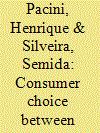|
|
|
Sort Order |
|
|
|
Items / Page
|
|
|
|
|
|
|
| Srl | Item |
| 1 |
ID:
110368


|
|
|
|
|
| Publication |
2011.
|
| Summary/Abstract |
The introduction of flex-fuel vehicles since 2003 has made possible for Brazilian drivers to choose between high ethanol blends or gasoline depending on relative prices and fuel economies. In Sweden, flex-fuel fleets were introduced in 2005. Prices and demand data were examined for both Brazil and Sweden. Bioethanol has been generally the most cost-efficient fuel in Brazil, but not for all states. In any case, consumers in Brazil have opted for ethanol even when this was not the optimal economic choice. In Sweden, a different behavior was observed when falling gasoline prices made E85 uneconomical in late 2008. In a context of international biofuels expansion, the example of E85 in Sweden indicates that new markets could experience different consumer behavior than Brazil: demand falls rapidly with reduced price differences between ethanol and gasoline. At the same time, rising ethanol demand and lack of an international market with multiple biofuel producers could lead to higher domestic prices in Brazil. Once the limit curve is crossed, the consumer might react by shifting back to the usage of gasoline.
|
|
|
|
|
|
|
|
|
|
|
|
|
|
|
|
| 2 |
ID:
169904


|
|
|
|
|
| Summary/Abstract |
This paper explores how gasoline prices affect the sales of new and used cars in Lebanon. Using a rich dataset on monthly imported cars from 2000 to 2016, a vector autoregressive analysis is used to model different consumer choices between fuel-efficient cars, midsize cars, and fuel-inefficient cars. We report the first empirical evidence on this question from the Middle East and North Africa (MENA) region using individual automobile data. We use within sample and out-of-sample tests to examine whether gasoline prices influence the sale of fuel-efficient cars. Our results show evidence against the hypothesis that rising gasoline prices shift consumers’ demand toward the most fuel-efficient cars.
|
|
|
|
|
|
|
|
|
|
|
|
|
|
|
|
| 3 |
ID:
110426


|
|
|
|
|
| Publication |
2011.
|
| Summary/Abstract |
This study seeks to the following: (1) understand the factors/characteristics typically considered when purchasing electrical appliances, (2) analyse the differences between consumer profiles regarding these and (3) understand the factors driving the consideration of energy efficiency class by purchasers. Results indicate a preference for first considering cost, followed by quality and energy consumption considerations. These are correlated positively with the consideration of energy efficiency class in consumer choices. Also, regression analysis shows environmental attitudes to be negative predictors of energy efficiency class consideration, while specific environmental behaviours were positive predictors. Finally, consumer profiles were identified based on gender, age and whether or not the purchaser was accompanied when decisions were made. Implications for retail employee training and the development of persuasive messages for consumers based on established profiles are discussed.
|
|
|
|
|
|
|
|
|
|
|
|
|
|
|
|
| 4 |
ID:
168305


|
|
|
|
|
| Summary/Abstract |
This paper examines transitioning to low carbon vehicles such as battery electric vehicles (BEVs), hydrogen fuel cell vehicles (FCVs), and natural gas vehicles (NGVs) for curbing greenhouse gas (GHG) emissions in Japan. Infrastructure development for fuel charging stations for BEVs, FCVs and NGVs and the carbon tax are evaluated as policy measures to promote these vehicle fleets as well as the reduction in the life cycle GHG emissions. Our analysis uses the newly developed Japanese multi-regional partial equilibrium system dynamics model UniSyD_JP. The energy supply sector consists of fossil fuels, nuclear energy, renewable energy and hydrogen and the nation's energy demand is projected by the expected population growth and the GDP outlook. The energy demand for the transport sector is endogenously determined by a consumer's vehicle choice characterized by the multinomial logit model. We examine five scenarios for different mixes of infrastructure development, carbon tax and projected oil price. The transition paths to a low carbon vehicle fleet are explored for the period of 2016–2060. We found that infrastructure development increases the penetration of FCVs and NGVs, but it will not reduce the life cycle GHG emissions. Significant emissions reduction requires both infrastructure development and high carbon taxes.
|
|
|
|
|
|
|
|
|
|
|
|
|
|
|
|
| 5 |
ID:
176729


|
|
|
|
|
| Summary/Abstract |
The introduction of smart technology and dynamic tariffs (such as time-of-use tariffs) provides multiple potential benefits for electricity markets. However, time-of-use tariffs generate additional complexity for consumer tariff choices in electricity markets. How well consumers can choose between tariffs, and whether certain tools improve these choices, are therefore important questions for energy regulators and policy makers. This paper presents an exploratory study that used experimental behavioural science to investigate consumer choice in electricity markets with time-of-use tariffs. A representative sample of consumers (n = 145) were given information about smart meters and time-of-use tariffs. A sequence of experimental tasks measured attitudes towards smart meters, comprehension of tariffs and quality of decisions between different types of electricity tariffs, where quality was judged against participants’ own perceptions of their electricity usage. The findings suggest that consumers struggle to match tariffs to usage accurately, with a general aversion to time-of-use tariffs that may lead to sub-optimal choices between tariff types. When participants chose between different priced time-of-use tariffs via an experimental price comparison site, decisions were significantly improved by a tool that personalised estimated costs. Policy implications include the importance of pre-testing interventions designed to improve consumer decisions.
|
|
|
|
|
|
|
|
|
|
|
|
|
|
|
|
| 6 |
ID:
150769


|
|
|
|
|
| Summary/Abstract |
The replacement of outdated and inefficient fossil fuel residential heating systems (RHS) by more efficient and less CO2-intensive appliances primarily based on renewable energy sources is an important pillar for the transition to a cleaner and more sustainable energy system. This paper empirically investigates drivers and barriers behind homeowners' decisions to switch from a fossil fuel to a renewable RHS in Germany. For this purpose, we draw on data from a 2010 questionnaire survey among owners of existing single-family and duplex houses in Germany that had received a financial grant to install an RHS (i.e. condensing boiler with solar thermal support, heat pump or wood pellet boiler). We show that environmental protection, a lower dependency on fossil fuels, and a higher degree of RHS-related knowledge are key drivers. In contrast, the perceived difficulty of getting used to the system and a misunderstanding of its principal functioning are obstacles for the heat pump. For the wood pellet boiler, perceived barriers include the low usability, the labor-intensive operation, and the systems' fault liability. Hence, a higher replacement rate requires the willingness to relinquish old habits and perceptions of how an RHS works and operates.
|
|
|
|
|
|
|
|
|
|
|
|
|
|
|
|
|
|
|
|
|